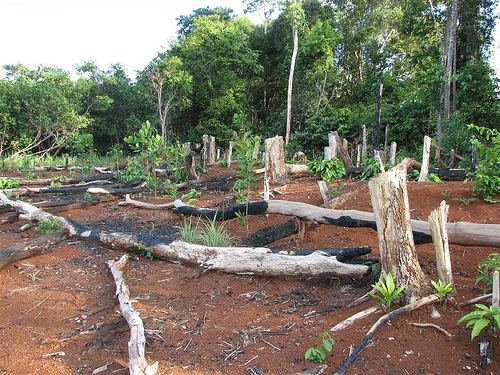Deforestation in Brazil's Amazon two-thirds lower on titled indigenous land
Granting secure land tenure to indigenous forest communities in Brazil's Amazon is a key way to stem rising deforestation rates in the world's largest rainforest, researchers said on Monday. Scientists consider protecting the Amazon rainforest vital to slow global climate change because of the vast amounts of planet-warming carbon dioxide its trees absorb.

- Country:
- Colombia
Granting secure land tenure to indigenous forest communities in Brazil's Amazon is a key way to stem rising deforestation rates in the world's largest rainforest, researchers said on Monday.
Scientists consider protecting the Amazon rainforest vital to slow global climate change because of the vast amounts of planet-warming carbon dioxide its trees absorb. Researchers combined information on property titles for demarcated indigenous lands granted by the government in the past three decades with satellite data on forest and vegetation cover to show the impact on deforestation rates from 1982-2016.
Study co-author Kathryn Baragwanath, a PhD candidate at the University of California in San Diego, said indigenous territories with full property rights saw a 66% reduction in annual deforestation compared with land outside their borders. "Once full property rights are granted to indigenous territories ... indigenous tribes are actually effective at curbing deforestation," she told the Thomson Reuters Foundation.
With rising deforestation rates, particularly in Brazil - home to the biggest share of the Amazon - protecting the rainforest is an urgent priority, including doing more to safeguard indigenous lands and tenure, scientists say. In Brazil's Amazon, deforestation hit an 11-year high in 2019 and has soared a further 25% in the first half of 2020, according to Brazil's National Institute for Space Research.
Forest cleared for cattle ranching, soy cultivation, illegal gold mining and logging are key drivers of Amazon deforestation. Environmental advocates blame right-wing President Jair Bolsonaro for emboldening illegal loggers, miners and land speculators to cut down the forest, with his vision of economic development for the region.
Bolsonaro has defended his plans to introduce mining and farming in protected reserves and on indigenous lands as a way to lift the Amazon region out of poverty. The new study, published in the Proceedings of the National Academy of Sciences (PNAS), supports previous findings published in 2019 on Colombia's Amazon and in 2017 on Peru's Amazon, which showed granting land titles to indigenous communities helped protect the rainforest and curb deforestation.
In Brazil, about 2 million hectares of indigenous land are under review to potentially receive collective property rights, the study said. Titling land is an effective way of preserving forests because it gives legal protection, making it less likely to be squatted, contested and eyed up by companies looking to extract natural resources, Baragwanath said.
"It's more difficult for (businesses) to get the legal rights to access the land because they have to go through more loopholes," she said.
(This story has not been edited by Devdiscourse staff and is auto-generated from a syndicated feed.)
ALSO READ
Lawmakers in Peru pass latest pension withdrawal proposal
Lawmakers in Peru pass latest pension withdrawal proposal
Peru's dengue deaths triple as climate change swells mosquito population
Health News Roundup: Peru's dengue deaths triple as climate change swells mosquito population; 'Time running out' in war-torn Sudan as access to aid restricted, WHO warns and more
UPDATE 1-Lawmakers in Peru pass latest pension withdrawal proposal










